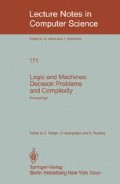Abstract
Let R1 be the total recursive functions from IN to IN, and Fin the set of all partial functions from IN to IN having a finite initial segment of IN as domain. Motivated by earlier studies on "simulation-universal automata" (BUCHBERGER&MENZEL 77/ MAIER, MENZEL&SPERSCHNEIDER 82/ MENZEL &SPERSCHNEIDER 82) we ask what it means that R1UF is recursively enumerable (r.e.), for a subfamily F of Fin. We show that each such family F is, in a certain sense, very rich. A (simple) corollary is that it must be dense in Fin w.r.t. the usual product topology on Fin. As a consequence one obtains simple but useful necessary conditions on F to make R1UF r.e. . We also consider the class Ext(R1) :={F⊑Fin | R1UF r.e.} as a whole. It is also quite rich in structure (e.g. if viewed as an upper semi-lattice w.r.t. union of families of functions). A sufficient criterion for F to be in Ext(R1) provides examples of families "naturally in Ext(R1)", thus demonstrating that richness. On the other hand, there are families which belong to Ext(R1) in a more nonstandard way. Main results:
-
There is an F in Ext(R1) which is itself not r.e..
-
For F in Ext(R1), F is r.e. iff F is "effectively dense in Fin", in some appropriate sense.
We conclude with a first look at Ext*(R1), which is the quotient semilattice of Ext(R1) modulo finite families. We prove that Ext*(R1) does not contain minimal elements.
Preview
Unable to display preview. Download preview PDF.
Abbreviations
- N:
-
the set of natural numbers, including 0
- I:
-
is called an initial segment of N iff I= N or I={x | x<k}, for some kε N
- f(x) ⇃:
-
f is defined at x
- f(x) ↑:
-
f is undefined at x
- dom(f):
-
{x | f(x)⇃}, the domain of f
- rg(f):
-
{f(x) | f(x)⇃}, the range of f
- graph(f):
-
{(x, f(x)) | f(x)⇃}, the graph of f
- f⊑g:
-
graph(f)⊑graph (g), g is an extension of f
- fГA:
-
the restriction of f to the set A
- fГx:
-
fГ{0,...,x-1}
- Pn :
-
the partial recursive functions from Nn to Nn
- Rn :
-
the total recursive functions from Nn to Nn
- Fin:
-
{δεP1 | dom(δ) is a finite initial segment of N}
- lg(δ)=1:
-
for δεFin, iff dom(δ) = {0,...,1-1}, 1 is the length of δ
- ϕ (n)i :
-
is the function in Pn computed by Turing machine i
- ϕi :
-
ϕ (1)i
- ϕi,t(x)=y:
-
Turing machine i with input x stops within t steps with output y, and i<t, x<t, y<t
- Wi :
-
dom(ϕi)
- Wi,t :
-
dom(ϕi,t)
- λx, y.<x, y>:
-
some standard pairing function, the corresponding component functions being λz. (z).1 and λz. (z).2
- F⊑P1 is r.e. :
-
iff there is some iε IN such that F={ϕk | kεWi}; Wi is then called a basis for F
- (Dn)nε N :
-
is the usual canonical numbering (coding) of all finite subsets of N
- (δn)nε n :
-
is some fixed canonical numbering of Fin (obtained for example via our pairing function and the numbering (Dn)nεN)
- For F⊑Fin:
-
in addition to being r.e., we say that F is canonically enumerable resp. canonically decidable iff {n | δn εF} is r.e. resp. decidable.
Literature
BUCHBERGER, B. & MENZEL, W. (1977), Simulation-universal automata, Interner Bericht Nr. 14/77, Institut für Informatik I, Universität Karlsruhe
MAIER, W., MENZEL, W. & SPERSCHNEIDER, V. (1982), Embedding properties of total recursive functions, Zeitschrift f. Math. Logik und Grundlagen der Mathematik, Band 28
MAL'CEV, A.I. (1970), Algorithms and recursive functions, Groningen
MENZEL, W. & SPERSCHNEIDER, V. (1982), Universal automata with uniform bound on simulation time, Information and Control, Vol. 52
POUR-EL, M. & HOWARD, W.A. (1964), A structural criterion for recursive enumeration without repetition, Zeitschrift f. Math. Logik u. Grundl. der Mathematik, Band 10
ROGERS, H. JR. (1967), Theory of recursive functions and effective computability, New York
SPERSCHNEIDER, V., The Length-Problem, in this lecture notes volume
Author information
Authors and Affiliations
Editor information
Rights and permissions
Copyright information
© 1984 Springer-Verlag Berlin Heidelberg
About this paper
Cite this paper
Menzel, W., Sperschneider, V. (1984). Recursively enumerable extensions of R1 by finite functions. In: Börger, E., Hasenjaeger, G., Rödding, D. (eds) Logic and Machines: Decision Problems and Complexity. LaM 1983. Lecture Notes in Computer Science, vol 171. Springer, Berlin, Heidelberg. https://doi.org/10.1007/3-540-13331-3_33
Download citation
DOI: https://doi.org/10.1007/3-540-13331-3_33
Published:
Publisher Name: Springer, Berlin, Heidelberg
Print ISBN: 978-3-540-13331-5
Online ISBN: 978-3-540-38856-2
eBook Packages: Springer Book Archive

